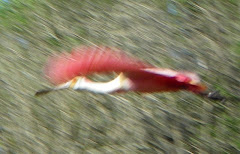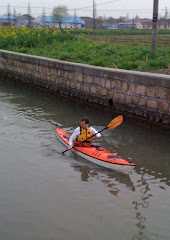Water is a great chameleon, seemingly able to change color
in an instant, yet we seldom notice the changes even when we are gazing out to
sea. We are so accustomed to seeing the many colors of water that we rarely
take note of where these colors come from.
 |
| Clear water in Indonesia appears blue-green in shallows, dark blue in deep |
So, what gives water its color? When we pour distilled water
into a glass it appears clear and colorless. In fact, although it is almost
transparent to visible light, it is very slightly blue.
Looking down into deep clear open ocean, the water appears
blue, dark blue. (see my blog post on the Kuroshio current, Taiwan)
 |
| Open ocean water appears dark blue |
That's because other wavelengths of light are more readily absorbed. Red is absorbed first, and next orange and yellow too. Blue and green penetrate through shallower water and blue penetrates farthest.That’s why we commonly see a variety of greens and blues in shallower water, but only blue in deep ocean.
Closer to land, plankton (see article for plankton distribution) typically makes
the water appear more green or brown.
 |
| Plankton colors this Pacific coastal water green |
But that’s not the end of the story. China’s second largest
river is aptly named “Yellow River” due to the color of the mineral sediment it
carries to the sea, and that affects the sea color too over a considerable area
near its mouth. Rivers commonly carry silt from runoff, especially when in
flood, and this can color the water red, yellow, brown or grey depending on the
eroding soil type. On the coast, waves stir up shore sediments that color the
water.
 |
| A suspension of silt colors this French river yellow |
Not all color is from particles in suspension. Dissolved tannin
from vegetation can turn a river blood-red, orange or yellow. In a glass such
river water is clear and the color of whisky, or black tea. It’s not cloudy. You
cannot filter out dissolved tannin. The red color of tannin-rich water acts as
a red filter, filtering out other colors of light including blue. But red light
cannot penetrate far into water anyway. Deeper water appears black. Such
tannin-rich streams are referred to as black water rivers.
 |
| Orange tannin-rich water flows across a track in Australia |
The true color of water, very slightly blue, plus what is in
it, dissolved or in suspension, still only accounts for part of what we see.
Sometimes the surface is colored with a layer of yellow pollen, or with
duckweed, so then it is the color of the surface covering we see.
 |
| Duckweed colors this waterway green |
At other times the
water is clear and shallow, and we see the color of the sand or mud of the
bottom.
 |
| Here in Florida we see the color of the bottom as the water color |
And then there are reflections that blend with or
completely hide the colors underneath. A blue sea under a blue sky can turn
grey on an overcast day. The color we see is often the color of the sky But you can gaze out over blue water in one direction and
turn your head to see the same water appear green with the reflection of a
green hillside. Given the water surface is not always flat, those reflections can
come from many directions, sending a mosaic of colors dancing across the
surface.
 |
| Reflection of a red hull in Seattle borders sky blue |
Artists have long made use of the crazy abstract patterns and color
combinations light creates on water,
 |
| Abstract patterns of reflection from a moored ship |
and they also tackle the multiple worlds
revealed when you glance down into the water to see first the reflections of above-water
surroundings, then the surface meniscus with floating debris, and below, through
the underwater scene to the dancing patterns of light cast by the lens of
surface ripples onto the bottom.
 |
| We see colors of the bottom, the water and reflections |
Water can appear in all the colors of the rainbow. I find it
always rewarding to take time to identify where the colors are coming from.
 |
| All the colors of the rainbow |
Find more about the Color of Water on Nigel Foster YouTube channel. Interested to have Nigel make a presentation to your group? Check out nigelkayaks

































No comments:
Post a Comment